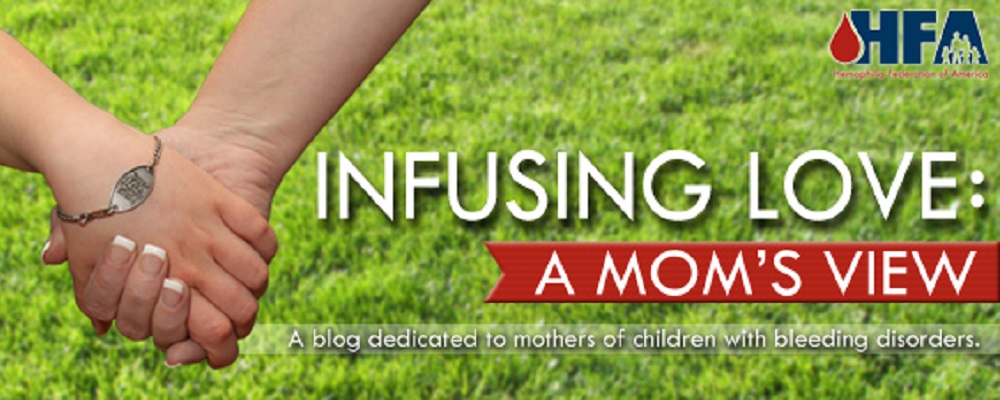
There are three words that I have a love-hate relationship with. The words are spoken with good intention and they aren’t fancy, SAT prep course worthy words. They are simple words, in a simple sentence, but there’s no simple answer to the question.
“How’s Thomas doing?”
It’s double-edged sword. It’s almost impossible for me to answer that question truthfully.
If Thomas is having a great run and has been through a stretch of no bleeding, the question strikes fear in me. I’m not a superstitious person, but my answer is usually a quick, “He’s good. What’s up with you?” because the good fortune he may have been experiencing has likely been jinxed with the asking and answering of that question. Many years ago when Thomas was younger, we went a long period of time without visiting the HTC. Our beloved nurse called to check on us and I gave a glowing report on how well he had been doing. The next day we were in the emergency room on our way to being admitted for a nasty, spontaneous bleed. I half-jokingly, half-seriously asked her to never call again. When the going is good, I don’t like to dwell on it, because I simply don’t know how long the good is going to last, and I certainly don’t want to jeopardize the length of good times. But when Thomas is not doing well, when his inhibitor is creeping higher, and he is bleeding often, the question is even harder to answer. I’m not sure people who ask really want to know the truth. If I answer it honestly and say that he’s in a great deal of pain, or that he is bored out of his mind, or that he’s missed two straight weeks of school and not a single one of his teachers has called to check on him, I’m met with pity or an uneasiness of how to respond. Most of the time, if I answer beyond, “He’s okay,” I can feel the other person’s discomfort. “He’s okay” is an okay way, a safe way, to answer.
But when Thomas is not doing well, when his inhibitor is creeping higher, and he is bleeding often, the question is even harder to answer. I’m not sure people who ask really want to know the truth. If I answer it honestly and say that he’s in a great deal of pain, or that he is bored out of his mind, or that he’s missed two straight weeks of school and not a single one of his teachers has called to check on him, I’m met with pity or an uneasiness of how to respond. Most of the time, if I answer beyond, “He’s okay,” I can feel the other person’s discomfort. “He’s okay” is an okay way, a safe way, to answer.
I understand others’ response, especially from someone who doesn’t have a love one with a bleeding disorder, because they don’t understand the unpredictability of this life. But when I answer, “He’s okay,” the truth is, he’s likely not okay. It’s not okay that he’ll probably have to repeat 7th grade this year after a school year full of bleeds. It’s not okay that two years ago, at 10 years old, he became dependent on narcotic pain medication. It’s not okay that he developed an inhibitor that we’ve never been able to eradicate. It’s not okay that this little boy has had to endure more pain, more discomfort, and more heartbreak in twelve years than most people have to experience in a lifetime. That’s not okay.
When I respond, “He’s okay,” what I really mean is we are surviving. We are surviving by living in the moment and tackling one day (and sometimes one hour) at a time. We excel at that – we are excellent crisis managers and coordinating last minute schedule changes when hemophilia strikes.
When we were hit with four bleeds in two days as Bleeding Disorders Awareness month rolled around this year, I decided to answer “How’s Thomas doing?” differently from now on: “He’s had a really tough go lately.” There’s no sugarcoating it, no downplaying our reality.
To be a good advocate, I have to be a truthful advocate, and it’s high time I share that truth: hemophilia is hard. Sure, I have this amazing kid who is stronger than most people will ever have to be, but it’s not okay what he’s had to go through to gain that strength, and that is a much as a double-edged sword as “How’s Thomas doing.”
_________________________
Sonji lives with her husband, Nathan, and three children Nora (14), Thomas, (12), & Natalie (10), in Colorado.
*Note: “Infusing Love: A Mom’s View,” is a blog collection of personal opinions and a representation of individuals experiences. While extensive efforts are made to ensure accuracy of the content, the blog entries do not represent HFA or its Board of Directors. The blog is also not intended to be construed as medical advice or the official opinion/position of HFA, its staff, or its Board of Directors. Readers are strongly encouraged to discuss their own medical treatment with their healthcare providers.



